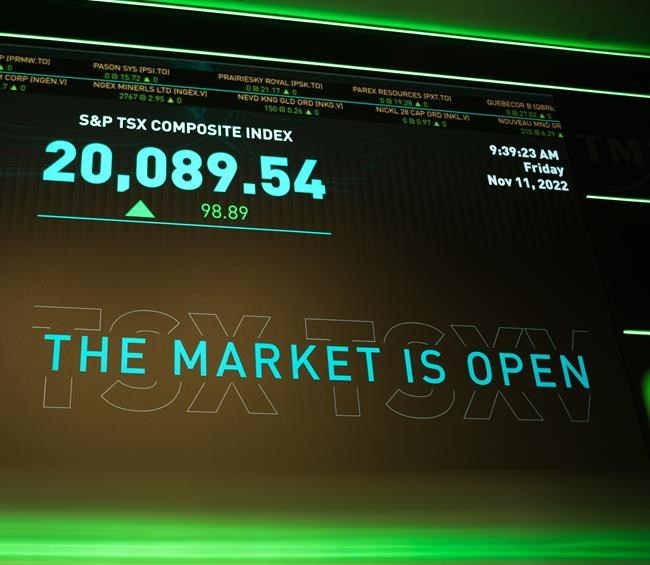TORONTO — Canada's main stock index closed up around 70 points Thursday, with mixed results across sectors, while U.S. markets largely held on to the outsized gains they made the day before.
“Based on what we saw yesterday, and the potential for volatility that we've been seeing every day around the inflation story, changes from central banks, and then ultimately, of course, the prospect of a slowing economy ... it's nice to have a day with a little bit of stability,” said Steve Locke, chief investment officer for fixed income and multi-asset strategies at Mackenzie Investments.
Markets in the U.S. especially made major gains Wednesday after Federal Reserve chair Jerome Powell said the central bank could soon start slowing its rate increases.
The Nasdaq composite gained 4.41 per cent Wednesday, while the S&P 500 gained more than three per cent, and the Dow more than two per cent.
On Thursday, the S&P/TSX composite index was up 72.19 points at 20,525.45.
In New York, the Dow Jones industrial average was down 194.76 points at 34,395.01. The S&P 500 index was down 3.54 points at 4,076.57, while the Nasdaq composite was up 14.45 points at 11,482.45.
“It looks like today's a bit of a consolidation day,” Locke said.
The Canadian dollar traded for 74.44 cents US compared with 74.03 cents US on Wednesday.
It’s been a volatile year for investors, said Locke.
“This year, we've had a lot of big ups and downs. And it relates, of course, to a lot of the macro risk factors that have been dominating the horizon here for investors as we go through this year and into next year.”
Powell’s comments Wednesday didn’t offer new information, and confirmed plans for a “restrictive policy” for a little while yet, said Locke.
“That is something that the yield curve has been grappling with ... when do we get the peak? When do we get rate cuts?” he said.
Now that the Fed’s path is a little more clear, the yield curve is pricing in its intended rate peak, said Locke.
Nevertheless, Locke expects elevated volatility to continue in 2023, and cautions investors to ensure their portfolios are diverse.
The January crude contract was up 67 cents at US$81.22 per barrel and the January natural gas contract was down 19 cents at US$6.74 per mmBTU.
Two Chinese cities eased their COVID-19 restrictions this week, after protests over the extended curbs spread across the country. Oil prices have been sensitive to news out of China recently due to its effect on global demand.
“China, being the second largest economy in the world, can have a significant impact on global growth, and ultimately has been seeing its own growth, its own domestic growth, flagging this year,” said Locke.
The February gold contract was up US$55.30 at US$1,815.20 an ounce and the March copper contract was up eight cents at US$3.82 a pound.
This report by The Canadian Press was first published Dec. 1, 2022.
Companies in this story: (TSX:GSPTSE, TSX:CADUSD=X)
Rosa Saba, The Canadian Press




